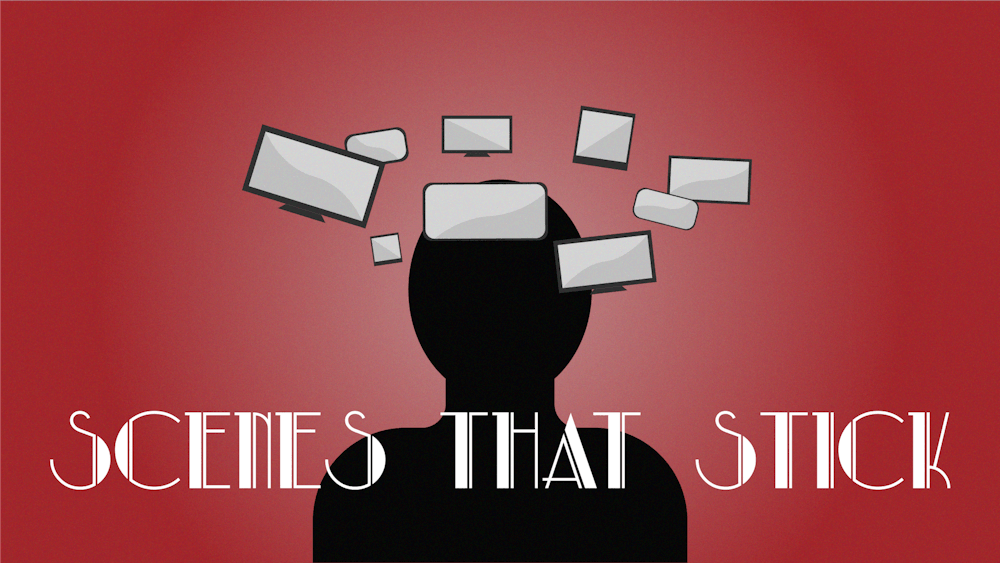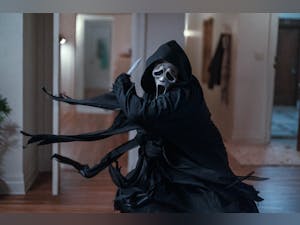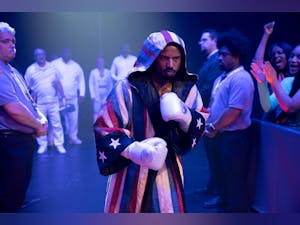From: Silver Screen
Scenes That Stick: ‘Atlanta’ analyzes the horror of white saviorism

Donald Glover’s “Atlanta” has been one of the most influential shows in the past few years. From portraying hip-hop culture, to offering critique on modern movements, “Atlanta” is far from your average comedy-drama.
However, one episode in particular stands out among the rest. The first episode in the fourth season, “Three Slaps,” is based on the true story of a white, lesbian couple that adopted six Black children and killed all of them. This episode specializes in vivid imagery and intense scenes that perfectly display white saviorism.
The start of the episode shows Loquareeous (Christopher Farrar) being slapped by his Black, single mother (Nicole Lockley) and grandfather (Timothy Tinker Sr.) due to him getting in trouble at school for dancing. A white guidance counselor ends up calling Child Protective Services after the slap, in order to do what they thought was best for the child.
When Child Protective Services arrives at the home, his mother thinks Loquareeous called the police, so she lets him go with them. The son is taken to a group home where a white, lesbian couple becomes his new parents and gives him the new name of “Larry.”
This scene represents the erasure of Black culture that occurs so often in American society. The foster parents are attempting to mold Loquareeous into someone they can use as a status symbol to tell the world they are “good people.”
Loquareeous and his new Black foster siblings are forced to do labor in the garden outside, and are fed very little. The foster kids are also given little privacy and end up in worse conditions than they were in before. The cinematography in this scene favors darker lighting, further highlighting the theme of white saviorism and how it can cast a cloud over marginalized groups.
The garden scene represents how even if white people are well intentioned, they can still have the slave owner mentality and treat Black people like they are below them. The white savior theme is emphasized by treating their foster children like they “saved” them and constantly reminding them they are doing them a favor.
This creates a full circle moment mirroring the start of the episode when the guidance counselor says she was going to get him “out of there.” She thought she was doing something good for Loquareeous, when in reality she put the son in a much worse situation.
Both the guidance counselor and the adoptive couple are clear metaphors for extreme white progressivism attempting to heal the wounds of history, only to backfire into oblivion and make situations worse.
The couple also constantly uses their adoption of Black foster kids to seem like they are good people, which allows them to pad their image and keep the children’s unsafe living conditions under the radar.
As time goes on, it’s clear the foster kids are sick of their environment. They begin to protest, but the foster parents keep working them like slaves, depriving them of sufficient food, and even asking them to sing songs while working.
Near the end of the episode, the couple puts their foster kids to sleep and drive off a bridge in a murder-suicide. Although viewers are given a somewhat happy ending as Loquareeous is able to escape the van, the real world situation was unfortunately different.
“Three Slaps” reenacts the “Hart Family Murders.” In 2018, Jennifer and Sarah Hart adopted 6 Black children from foster care and abused them constantly. When the abuse was called out, they homeschooled their kids, eventually ending in the murder-suicide that this episode re-enacts.
“Three Slaps” discusses the horrors of foster care and how it perpetuates a white savior mentality. It also shows how the attitudes of “progressive” white people can often do more harm than good, no matter how well intentioned they are. It makes the audience question how the white saviorism mentality is prevalent in their own lives, and if they are any better than the adoptive parents in the show.
This article was edited by Bailey Hobbs, Kylie Bill and Nina Heller. Copy editing done by Isabelle Kravis, Sophia Rocha and Stella Guzik.




